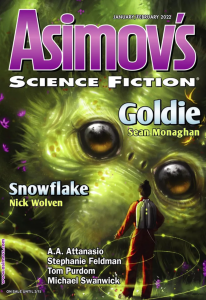Karen Burnham Reviews Short Fiction:Analog and Asimov’s
When I took over part of the Locus short fiction reviewing duties after Gardner Dozois’ sad passing in 2018, I figured I’d be sharing this space with Rich Horton for many years to come. But as he announced in January, he has retired from his column and is turning his attention elsewhere – especially to adorable grandchildren! So I find myself starting on this verso page for the first time. While I do so, I’d like to thank those who’ve filled this role – Rich, Gardner, Nick Gevers, and Mark Kelly, just since I started reading Locus, and several others before. I don’t suspect you’ll see any dramatic changes here except for how we’ve reshuffled “who reviews what,” but other than that I expect these columns to keep evolving with the field which has grown and expanded so much since Locus’s founding in 1968 – pretty much entirely for the better.
With that let me greet 2022, lo these three months late, thanks to the nature of publishing schedules. I hope everyone’s all set to nominate and vote for 2021 titles based on all that you read and we reviewed up through February, since from here on out we’re on to the new year for good. For me, the new year started by picking up an old friend, Analog Science Fiction and Fact, that I hadn’t checked in on in quite a while. The opening novella of the Jan/Feb issue, “Communion” by Jay Werkheiser & Frank Wu, was definitely jumping into the deep end. The story manages the tricky task of commingling action at both the human and microscopic scales and making each a real story that matters to the other. The sections told at the microscopic level reminded me of all the times I skipped biology and chemistry classes in favor of math and physics, but as the story progresses everything falls into place, along with some well-placed levity on the human side of the equation. The pilot Nes crashes into a small icy planet and is then infected by a native intelligent microbe when an ice shard jabs through his suit. The microbe finds itself cut off from its brethren and in an alien environment but fighting against one of its own kind. Nes is on the verge of succumbing, and his ship AI, Alex, has to draw on its multiple human personality modules to try and solve the problem (a source of much of the humor). It took me a while to figure out how the sections related to each other in terms of timing, but by the end it’s a harmonious, fun, and educational read – exactly the kind of thing you turn to Analog for.
This issue is also a good one for debut and newer authors. We have a first story from Meghan Hyland, “Splitting a Dollar”, in which an AI manipulates two humans on the Moon, forcing them into an uncomfortable choice. I could have used a little more context, but the story sets up an interesting dilemma. Ted Rabinowitz is another new writer, and “Charioteer” ramps up the tension as a female ex-astronaut is in a race around the Sun and realizes her ship has been sabotaged. She solves problem after problem as her situation devolves, and we also learn how she’s made enemies in high places – there are some problems no amount of ingenuity can solve. “Patience” by David Cederstrom is another debut, imagining an alien species that has both humanoid and tick-like characteristics. We start the piece from the alien’s point of view, and then see how the humans perceive it. “The Middle of Nowhere” is Rachel S. Bernstein’s debut. In a world where people can be teleported as data packets, there must be people out there trying to hack those transmissions and others who are trying to protect them. It’s computer science with lives on the line.
David Whitaker’s flash piece “Soroboruo Harbormaster’s Log” sketches out the future history of an entire solar system as it notes the name, date, and population of the system each time a new ship enters, usually bearing colonists. It’s a remarkably concise way of charting the rise, decline, and fall of a system. “The Way Back” by Jen Downes sketches out a single life in vignettes, starting when T.J. is age 7 and decides to go to space. T.J. gets onto a good crew, is overtaken by war, and we eventually find them back on Earth. It packs a lot of living into a fairly short story. Louis Evans brings us a fascinating edge case of medical privacy gone wrong in “Doe No Harm” when a burn victim’s maxed-out privacy settings and inability to communicate mean that advanced medical technology won’t even recognize him to treat him, forcing the surgeons to fall back on “archaic” methods.
As we move over to Asimov’s magazine for Jan/Feb, I should note that subscribing to these magazines is like getting two full anthologies every other month. The Analog issue has nineteen stories including a novella and three novelettes. Asimov’s “only” has eleven stories, but that includes two novellas and another three novelettes. For those with the financial resources to support speculative short fiction, you’re getting pretty incredible value for the money.
In Asimov’s we have two new authors among the more familiar names. “Welcome Home” is the debut for Jendayi Brooks-Flemister. Theresa is a struggling single mom whose prayers are answered when she’s able to get a “smart home” for an actually affordable rent – but it requires signing quite an extensive contract with a ubiquitous Amazon-like company. She goes from creeped out by the house AI, which sometimes orders food or clothes without asking first, to quite happy with its features – only to go back to being creeped out when it calls up a doctor for a house visit when it detects that her daughter has a fever. The threat of child protective services looms over the whole arrangement, and it has the hallmarks of a paternalistic trap. Theresa’s concerns and decisions felt absolutely grounded in the real world. “The Roots of Our Memories” by Joel Armstrong has an interesting premise: using the fungal/tree root system of a cemetery to access memories from the brains of the deceased. Aiden runs the cemetery and helps a young woman who, while she cannot access her father’s memories yet, keeps coming back to learn more about her grandmother. Aiden is also fighting for funding to help prevent infestation from an invasive species that’s headed their way, so the whole story is tinged with a sense of transience.
Tom Purdom brings us “Long-Term Emergencies”, which goes deep into corporate politics when an in-game dispute between co-workers at a security firm goes viral. Although the game has nothing to do with the business, the conflict is apt to do reputational harm, so Mukeree is tasked with finding a resolution. It’s no simple task given the web of relationships between people who have almost post-human lifespans, and the fact that they operate on a relatively small space station – small group politics are tricky no matter where on or off Earth you are. Stephanie Feldman’s “The Boyfriend Trap” features a woman who hasn’t yet realized that her boyfriend is pretty awful for her. He’s trying to keep her from moving to Denver for her career and they go to a cabin in the woods for a weekend away. In a moment of panic she follows a light in the woods, and when she returns she finds a subtly different version of her boyfriend – kinder, gentler. But things that happen in cabins in the woods are rarely benign.
Recommended Reading
“Welcome Home”, Jendayi Brooks-Flemister (Asimov’s 1-2/22)
“Communion”, Jay Werkheiser & Frank Wu (Analog 1-2/22)
This review and more like it in the March 2022 issue of Locus.
 While you are here, please take a moment to support Locus with a one-time or recurring donation. We rely on reader donations to keep the magazine and site going, and would like to keep the site paywall free, but WE NEED YOUR FINANCIAL SUPPORT to continue quality coverage of the science fiction and fantasy field.
While you are here, please take a moment to support Locus with a one-time or recurring donation. We rely on reader donations to keep the magazine and site going, and would like to keep the site paywall free, but WE NEED YOUR FINANCIAL SUPPORT to continue quality coverage of the science fiction and fantasy field.
©Locus Magazine. Copyrighted material may not be republished without permission of LSFF.


 Analog 1-2/22
Analog 1-2/22




Karen,
Thank you for your kind words about “Communion” – my (Frank Wu) and Jay Werkheiser’s novella from the January Analog.
We’ve posted a new (tighter) version of the story, with brand new illustrations, including diagrams to explain the complicated science-y bits.
Frank
http://frankwu.com/Communion9.html